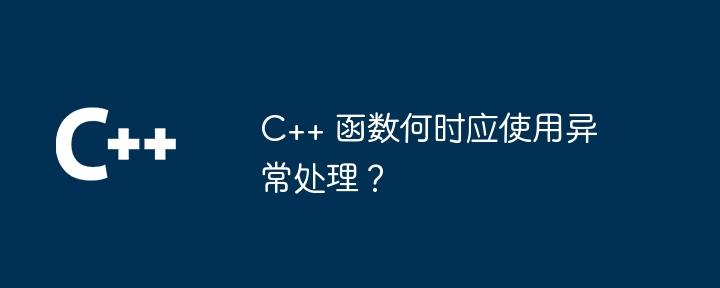When should C++ functions use exception handling?
Apr 23, 2024 pm 12:06 PMC functions should use exception handling in the following situations: Serious errors: Serious errors that cannot be handled inside the function, or affect program stability. Resource Management Error: Resource management error such as freeing unallocated memory or opening a non-existent file. External factors: External factors, such as network failures or user input errors, cause function execution to fail. Exception handling should not be used in the following cases: General errors: Common errors that can be easily handled inside the function. Performance impact: Avoid overuse in critical or heavy code paths where performance will be impacted. Code redundancy: Exception handling will introduce additional code, affecting code redundancy and readability.

#When should C functions use exception handling?
Exception handling is a mechanism for catching and handling unusual conditions or errors during code execution. In C, exception handling can be implemented using try-catch blocks.
When to use exception handling
- Serious errors: When a serious error occurs in a function, it cannot be handled reasonably inside the function Errors, or bugs, can affect the stability of the entire program.
- Resource management errors: When a function encounters a resource (such as a file or memory) management error, such as freeing unreserved memory or opening a file that does not exist.
- External factors: When the function is affected by external factors (such as network failure or user input errors), and these factors will cause the function execution to fail.
When Not to Use Exception Handling
- General Errors: For common errors that can be easily handled inside a function, Exception handling should not be used.
- Performance impact: Exception handling incurs some performance overhead, so excessive use in critical or heavy code paths should be avoided.
- Code redundancy: Exception handling introduces additional code, which may lead to code redundancy and reduced readability.
Practical case
The following is an example function that uses exception handling to handle file read errors:
#include <fstream>
using namespace std;
void readFile(string filename) {
try {
ifstream file(filename);
if (file.fail()) {
throw runtime_error("File not found");
}
// ... 处理文件 ...
} catch (runtime_error& e) {
cerr << "Error: " << e.what() << endl;
}
}In this example , the readFile function attempts to open the given filename, but if the file does not exist, it will throw a runtime_error exception. We then use a try-catch block to catch the exception and print the error message.
The above is the detailed content of When should C++ functions use exception handling?. For more information, please follow other related articles on the PHP Chinese website!

Hot Article

Hot tools Tags

Hot Article

Hot Article Tags

Notepad++7.3.1
Easy-to-use and free code editor

SublimeText3 Chinese version
Chinese version, very easy to use

Zend Studio 13.0.1
Powerful PHP integrated development environment

Dreamweaver CS6
Visual web development tools

SublimeText3 Mac version
God-level code editing software (SublimeText3)

Hot Topics
 C++ object layout is aligned with memory to optimize memory usage efficiency
Jun 05, 2024 pm 01:02 PM
C++ object layout is aligned with memory to optimize memory usage efficiency
Jun 05, 2024 pm 01:02 PM
C++ object layout is aligned with memory to optimize memory usage efficiency
 How to implement a custom comparator in C++ STL?
Jun 05, 2024 am 11:50 AM
How to implement a custom comparator in C++ STL?
Jun 05, 2024 am 11:50 AM
How to implement a custom comparator in C++ STL?
 How to implement the Strategy Design Pattern in C++?
Jun 06, 2024 pm 04:16 PM
How to implement the Strategy Design Pattern in C++?
Jun 06, 2024 pm 04:16 PM
How to implement the Strategy Design Pattern in C++?
 Similarities and Differences between Golang and C++
Jun 05, 2024 pm 06:12 PM
Similarities and Differences between Golang and C++
Jun 05, 2024 pm 06:12 PM
Similarities and Differences between Golang and C++
 What are the underlying implementation principles of C++ smart pointers?
Jun 05, 2024 pm 01:17 PM
What are the underlying implementation principles of C++ smart pointers?
Jun 05, 2024 pm 01:17 PM
What are the underlying implementation principles of C++ smart pointers?
 How does C++ exception handling support custom error handling routines?
Jun 05, 2024 pm 12:13 PM
How does C++ exception handling support custom error handling routines?
Jun 05, 2024 pm 12:13 PM
How does C++ exception handling support custom error handling routines?
 How to implement C++ multi-thread programming based on the Actor model?
Jun 05, 2024 am 11:49 AM
How to implement C++ multi-thread programming based on the Actor model?
Jun 05, 2024 am 11:49 AM
How to implement C++ multi-thread programming based on the Actor model?








